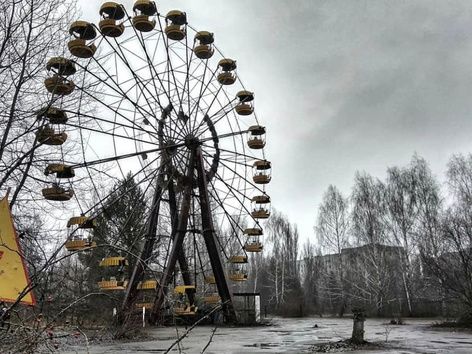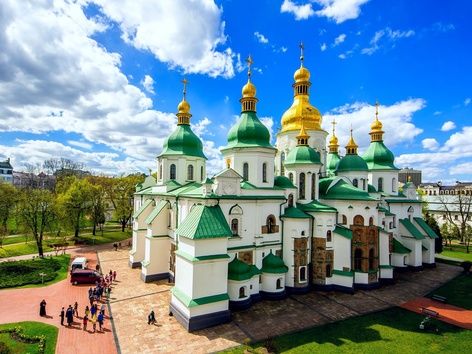Modern history of Chornobyl: chronology of occupation and de-occupation, restoration of tourism

Today, Ukraine and the world commemorate the liquidators of the Chornobyl disaster. At the beginning of the full-scale war, the city also experienced a Russian invasion. We talk about the consequences of the russian invasion and what Chernobyl looks like today
On the night of April 26, 1986, an accident occurred at the Chernobyl NPP, which was later recognized as the world's largest disaster in the history of nuclear power. Specialists struggled with the consequences of this tragedy for many years.
However, no sooner had the Ukrainians managed to defeat the invisible enemy - radiation - than a great disaster came to their land again - a full-scale invasion of the Russian army of killers.
Unfortunately, Chernobyl was one of the first to meet the evil enemy and was under occupation from the first hours of the great war.
Read the history of the occupation of Chernobyl and its consequences, as well as the future prospects of the exclusion zone in our material.
Chronology of the occupation of Chernobyl
Article 56 of the Protocol of the Geneva Conventions prohibits any military actions near nuclear facilities. However, this did not stop Putin's army.
The closed territory near the nuclear plant is close to the border with Belarus, it was from there that on February 24, 2022, armored vehicles of the Russian army invaded Ukraine. Part of the occupiers seized the Chornobyl NPP and dug in in the Red Forest, the rest continued their movement to Kyiv.
On the day of the invasion, already at 04:15 from the territory of the Chernobyl zone, missile launches from the side of Belarus were visible. The evacuation of the population began with the first volleys of enemy rockets. There were about 3,000 civilians in the city of Chernobyl. Unfortunately, not all were able to leave. The invaders took hostage the employees of the nuclear plant and 169 National Guardsmen who guarded the territory of the NPP. About 80 local residents (samosel) remained in the occupation. These people have already survived the Chernobyl disaster and refused to leave their homes and farms when the war started.
After the evacuation was completed, the military blew up the bridge across the Uzh River, which temporarily slowed down the enemy's advance. However, in the evening, the active movement of equipment was resumed.
It was possible to determine the exact amount of equipment that entered the territory of Ukraine through the exclusion zone thanks to the video surveillance system of the tourist operator "Chernobyl-tour", which was installed at the organization's information centers in the Chernobyl zone.
According to the information of the director of the travel agency, Yaroslav Emelianenko, the Russians immediately turned off the electricity and shot the cameras at the state checkpoint, but they did not notice them. The video surveillance system in the information centers was autonomous, with a battery for several days of operation, because there were power outages in this area even during peacetime.
In the first days of the war, the employees of "Chernobyl-tour" were on duty around the clock, recording the number of Russian military equipment on cameras and transmitting the data to the military. The convoys drove towards Kyiv continuously - tanks, BMPs, anti-aircraft missile launchers, armored cars, guns, security vehicles, even rode on quad bikes and carried pontoons. There were so many of them that at one point the entire road to Ivankov was blocked by cars, they could not physically go any further. Fortunately, brave Ukrainian defenders persevered, defended their land and de-occupied the Chernobyl nuclear power plant zone.
Trenches in the Red Forest and hunting local game: how did the occupiers "distinguish" themselves in Chernobyl?
The enemy invaded the Chernobyl zone simultaneously in five different ways. It is worth noting that the last time people traveled along certain roads by which the Russians entered the exclusion zone, even before the accident at the power plant, because the level of radiation on many of them is quite high and dangerous for health. There were also cases when the occupiers collected water for domestic purposes from the reactor cooler or hunted game that was near the reactor. From this we can conclude that most of the Rashists did not understand the level of danger of the Chernobyl zone.
Information that the occupiers are digging trenches in the Red Forest was also spread quite actively in the mass media. According to Yaroslav Emelianenko, he learned about this from local residents who remained in the occupation and maintained contact with the "Chernobyl-tour" team. It was he who spread the information about the trenches and the possible consequences for the invaders. The team of the travel agency informed that all the orks who were at the Chernobyl station and dug in in the Red Forest, who were taking Ukrainian equipment from Irpen or Buchi through the exclusion zone, raised radioactive dust and received deadly doses of radiation. To some extent, it was IPSO against the enemy, which worked quite successfully. With the help of this story, Ukrainians were reassured that the danger could not go beyond the borders of the Chernobyl zone, and the enemies were convinced of the mortal danger for them. It was important to break the enemy's spirit.
Of course, you can safely stay in the Red Forest for a limited time. Burying into the ground, where radionuclides are washed away and stabilized with every rain, is stupidity, but you won't get a lethal dose of damage there.
De-occupation of the Chernobyl nuclear power plant and the consequences of the invasion
Russian terrorists finally left the territory of the Chernobyl nuclear power plant on March 31, 2022. Before withdrawing the troops, the occupiers forced the station staff, whom they held hostage, to sign an "official" act. According to this piece of paper, the terrorists "guarded" the Chernobyl nuclear power plant all this time, and the employees of the nuclear power plant have no complaints against them.
At the same time, the occupiers, retreating, ransacked the Chernobyl NPP, took valuables from the premises, stole equipment and other valuables. They also took with them employees of the Ukrainian National Guard, who guarded the Chernobyl station.
The raiders ransacked the laboratories, where there was state-of-the-art dosimetric equipment and test sources of radiation for setting up laboratory sensors. To be near these samples without protection for several hours is death. Sensitive equipment, such as a toilet or a washing machine, was uprooted and thrown into a military vehicle. A loaded military vehicle could drive for 3-5 hours. Maybe the orcs were even sitting on that equipment all this time. The body cannot cope with such a dose of radiation.
Therefore, for many racist invaders, a trip to the Chernobyl nuclear power plant zone will have its consequences.
Chernobyl today
The territory of the Chernobyl Exclusion Zone is currently calm. However, after the de-occupation, the local authorities forbade entry here even for volunteers. Any movement in the zone is now under strict control of the military, border guards and police.
Currently, the level of radiation in the Chernobyl zone is the same as it was before the invasion. The rains that passed last summer and autumn washed all the radionuclides raised by the Russians back into the ground.
For the security of Ukraine, the border area is currently mined. However, it is far from the main roads of the Chernobyl zone. Also, it is worth noting that the exclusion zone has always been a regime facility, it was forbidden to move there without the support of specialists, because certain areas have a fairly high level of radiation pollution. The head of the tourist operator "Chernobyl-tour" assures that if the safety rules are followed during the trip, there is no threat to the health of tourists.
Therefore, the team of the travel agency is waiting for the opening of the zone, because the organization is already receiving many requests from journalists and documentarians, including foreign ones, who want to tell the world about the events of the modern history of Ukraine.
We hope that the Chernobyl exclusion zone has already turned another difficult page in its history and will be able to tell tourists about it very soon, already in free and peaceful Ukraine!
You may be interested in:
Visit Ukraine Donation - make a good deed and an important contribution to the Victory of Ukraine;
Visit Ukraine Tours - the largest online database of tours to Ukraine for every taste;
Visit Ukraine Merch - choose patriotic clothing and accessories with worldwide delivery;
Visit Ukraine News - get the latest news and updates in our Telegram channel;
Cooperation - cooperation and advertising integrations with Visit Ukraine and Visit World projects.
Recommended articles
1 min
Regeln für die Einreise
How to get from Italy to Ukraine: convenient routes
The lack of air travel reduces the number of options for getting to Ukraine. But the country's land borders are open, so we have prepared routes to enter Ukraine from Italy for everyone
25 Apr. 2023
More details1 min
Travel
UNESCO World Heritage in Ukraine: what places are definitely worth seeing
Ukraine is home to 8 UNESCO World Heritage Sites, including St. Sophia Cathedral in Kyiv, ancient Chersonese, and ancient beech forests in the Carpathians. Here's what other UNESCO World Heritage Sites you can see in Ukraine and what they are famous for
25 Apr. 2023
More details1 min
Ausbildung
Admission to Polish Universities: changes for Ukrainians in 2023
Ukrainians have the right to enter Polish universities. In particular, the government of the country met the needs of applicants and adopted amendments to the Special Act on Assistance to Ukrainians. Learn more about the new conditions for admission to Polish universities
25 Apr. 2023
More details1 min
Popular
Rules for traveling in public transport in the EU: fines and prohibitions
In order to avoid troubles in the EU countries, it is worth knowing the rules of public transportation. Here are the main rules and reservations that Ukrainians should keep in mind when using public transport in the Czech Republic, Poland, Germany, and Switzerland
25 Apr. 2023
More details

